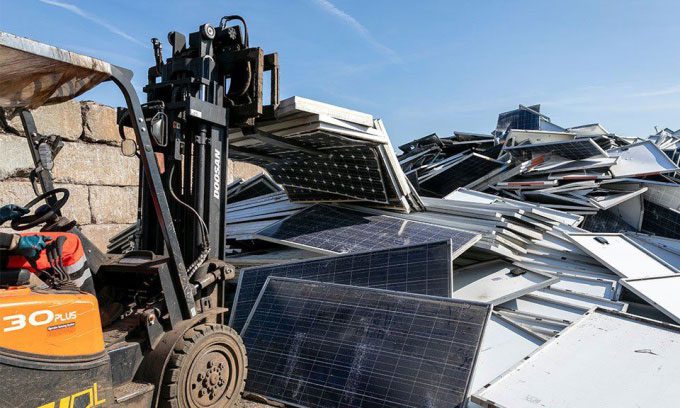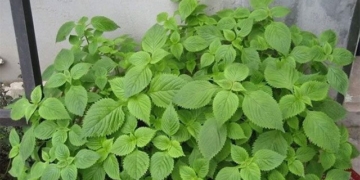While considered a weapon to reduce carbon emissions, solar panels have a lifespan of only 25 years, raising significant concerns about waste and recycling.
“The world has installed over 1 terawatt of solar power. Solar panels typically have a capacity of around 400 W, so when considering rooftops and solar farms, there may be up to 2.5 billion solar panels,” BBC reported on June 3, quoting Dr. Rong Deng, a solar panel recycling expert at the University of New South Wales.

Forklift dropping solar panels into a large pile. (Photo: BBC/Laurent Julliand).
According to the UK government, there are tens of millions of solar panels in the country. However, the specialized infrastructure for their disposal and recycling is still lacking. Energy experts are urging the government to take urgent action to prevent the risk of a global environmental disaster from this type of equipment.
The global solar power generation capacity increased by 22% in 2021. Approximately 13,000 solar panels are installed in the UK each month, mostly on residential rooftops. If the current growth trend continues, the volume of solar panel waste will be substantial, according to Ute Collier, Deputy Director of the International Renewable Energy Agency (IRENA).
“By 2030, we expect there will be around 4 million tons of waste, which is manageable. But by 2050, we could see over 200 million tons globally,” Collier stated. Meanwhile, the world produces a total of about 400 million tons of plastic each year.
Experts hope a significant breakthrough will occur at the end of June when the world’s first facility aimed at fully recycling solar panels officially opens in France. The facility is owned by the solar recycling company ROSI. This company hopes to eventually extract and reuse 99% of the components from a solar panel.
In addition to recycling glass and aluminum frames, the new facility can recover nearly all valuable materials in solar panels, such as silver and copper, which are often among the hardest materials to extract.
British scientists are working to develop technology similar to ROSI. Last year, a research team at the University of Leicester announced that they had discovered a method to extract silver from solar panels using a type of saline water.
However, to date, ROSI is the only company in the solar panel recycling sector that has scaled its operations to an industrial level. Additionally, this technology is very expensive. In Europe, solar panel importers or manufacturers are responsible for handling them when they are no longer usable. Many of these companies prefer to crush the panels instead because this method is much cheaper.




















































